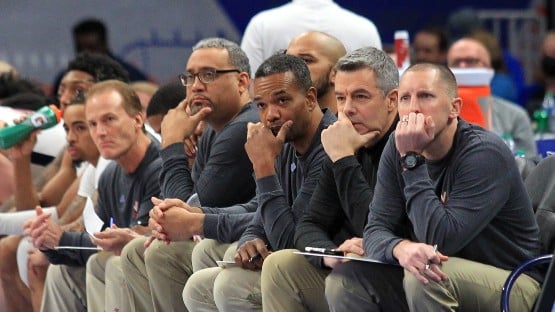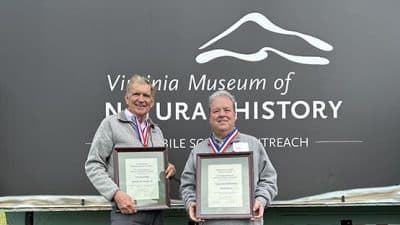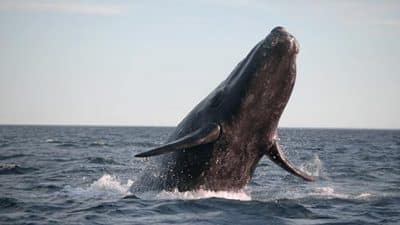The Top Story by Chris Graham
Scott Obenschain is glad he answered his phone.
“I was going to stay, originally, but on the Sunday before the storm hit, a friend of mine called me up and said, ‘It’s a Category 5, and it’s heading our way. Let’s go,’ ” said Obenschain, a Staunton native who moved to New Orleans five autumns ago to pursue a career in jazz music.
“She had a car, which I don’t, and she had family in Pensacola, Fla., which I don’t. So I said, ‘Come on over.’ I filled up a bag of groceries from the refrigerator, got some sodas and some water, and put a few changes of clothes in my accordion case, threw it in the back of her car, and we got on the road,” Obenschain said.
He’d originally thought that he’d be in Florida for maybe a day or two at the most, he told The Augusta Free Press.
“Then we saw the television and realized the extent of the damage and knew that we weren’t going to be going back anytime soon,” Obenschain said.
Getting out of Dodge
“We averaged maybe 25 miles per hour at the most. It was stop and go in a few places. We saw wrecks along the way, and people broken down along the way, and people out of gas along the way,” Obenschain said of his escape from New Orleans pre-Katrina.
“Evacuating is not as easy as people might just assume that it is. When you take into account a whole bunch of people moving, there’s not enough gas, there’s nowhere to eat. It was just a big mess,” Obenschain said.
Fellow musician Ryan Burrage decided to stay in town and take his chances. His apartment in the French Quarter was untouched by Katrina, he told the AFP.
But property damage was only one item on the list of post-Katrina worries.
“There wasn’t much in the way of assistance at all until the National Guard came the Friday after the storm,” said Burrage, who left New Orleans on Sept. 4, six days after Katrina blew its way across the Gulf Coast.
Drawn by the music
Obenschain grew up listening to New Orleans jazz.
“Even more amazing is that I grew up listening to records of The Dukes of Dixieland, and moved to New Orleans and got a job with that very band,” said Obenschain, who has been working as a professional musician in New Orleans since 2001.
“I’ve met people that played on the records that I listened to, and even played jobs with a lot of the same people that were playing back then in that band,” Obenschain said.
Obenschain was drawn to the Big Easy by the polyphony of its jazz.
“Everybody’s playing at the same time. If you have a trumpet player, a trombone player and a clarinet player in a more modern style of jazz group, everybody plays the melody together, in unison or in harmony, and then everybody takes a solo. But in Dixieland music, the traditional jazz music, it’s played in a way that everybody is soloing at the same time,” Obenschain said.
“Somebody will play the melody, and somebody else is improvising around it all the time. And even the person playing the melody takes a whole lot of liberties. And you can go chorus after chorus, and it’s like jamming where everybody is doing something different. So as a player, it’s just loads of fun, because you’re not limited to a written line or to waiting your turn to play your solo,” Obenschain said.
Having been a fan of the music from childhood, Obenschain arrived in New Orleans thinking that he knew everything that he needed to know about the music – “but I soon learned that I didn’t know anything,” he said.
“The most surprising thing to me was that New Orleans jazz, in itself, has evolved over the years, just as modern jazz and West Coast jazz and bebop have evolved and changed,” Obenschain said. “For instance, I can listen to Dixieland music and tell from the way the guys are playing that it’s from the ’90s or from the ’60s or from the ’30s or ’20s or even the 1800s. That music, in its own branch off of the jazz tree, has really changed over time.
“That was one of the things that even now, when I’m playing with the Dixieland band, I have to listen to what the other guys are playing and figure out what style they’re playing in and which way to go with it,” Obenschain said.
The aftermath
The problem in New Orleans in the aftermath of Katrina wasn’t so much the looting that was reported widely in the mainstream news media, Burrage said.
“There was a lot of sensationalized reporting with the looting. I didn’t see anything personally,” Burrage said.
What was going on in terms of looting, he said, “was sanctioned by the police because of the fact that people weren’t getting help.”
“It was for food, water and other necessities. And then there were the idiots who would take it a step further. They looted a leather shop and a Harley-Davidson store. What are you going to do with that?” Burrage said.
Obenschain, like Burrage, should have something to go back home to when he finally makes his way back to New Orleans.
“As far as the place being untouched by the water, I was lucky there,” Obenschain said.
He is reminded of that every time he turns on his television.
“When they show the helicopters flying over the city, I’ll look and say, well, that’s a neighborhood that my friend lives in, and I have another friend that lives over here, they probably got flooded out,” Obenschain said. “I have a hunch that a lot of my co-New Orleanians are looking at that and finding their own neighborhoods and houses.”
The response
Burrage said the media has gotten one thing right about the response to the Katrina disaster – that it has been lacking, from FEMA to the Red Cross on down.
“I just don’t see anything working the way that you would think it would,” Burrage said. “I personally haven’t received anything from FEMA. And the Red Cross gave me $130. I don’t see them really doing anything. That’s starting to come out in the media, too. Hopefully they can expose it even more, because it’s ridiculous.”
Burrage and Obenschain are planning to do their part to get more in the form of aid flowing back to New Orleans. They are playing a benefit concert tonight at 7:30 p.m. at Covenant Presbyterian Church in Staunton to raise money for disaster relief.
“It’s what I do best,” Obenschain said. “I’ve been cramming, you could say, New Orleans music into my brain for the past five years. A lot of my friends back here don’t really know anything about it. It’s a great opportunity for me to share what I’ve been doing with people that aren’t really familiar with what I’ve been doing and at the same time support a worthy cause.
“I miss it,” he said of New Orleans and its jazz. “And having some of my friends in town from New Orleans, it’s only natural for us to play together. Because that’s what we did there. Inevitably, we play together, so it only makes sense to do what we do anyway for a worthy cause.”
Burrage is itching to perform as well.
“I just want to play again,” he said. “I’ve been up this way before. I like this area. I love this part of the world. But I just want to play again, and there aren’t many opportunities to do that here.”
The future
Obenschain, Burrage and a group of their friends and fellow musicians from New Orleans are holed up in Staunton for the time being – waiting out what happens next.
“It will never be the same. That’s obvious, I think,” Obenschain said. “What will happen will depend on the people, who goes back. What I’m concerned about is that with the amount of time that the people who were there are going to be away, they will get new jobs, they will get new homes, their old homes are ruined.
“The people who come back will probably be those people who were really dedicated to the New Orleans feeling. That’s an assurance in my mind that the city of New Orleans will be back,” Obenschain said.
Burrage, for his part, thinks the city will come back from Katrina as strong as ever.
“A lot of people think it’s going to be faster than I think. I think by New Year’s it will be back to just about where it was, once they get the hotels back and the airport open for tourism and drain all the water out. I think it’s going to be fine,” Burrage said.










